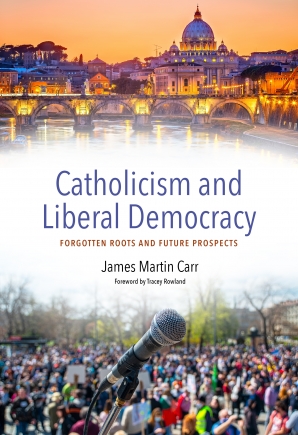- Home
- religion
- political science
- Catholicism and Liberal Democracy
Preparing your PDF for download...
There was a problem with your download, please contact the server administrator.
Catholicism and Liberal Democracy
Forgotten Roots and Future Prospects
Foreword by Tracey Rowland
Imprint: Catholic University of America Press
Catholicism and Liberal Democracy seeks to clarify if there is a place for Catholicism in the public discourse of modern liberal democracy, bringing secular liberalism, as articulated by Jürgen Habermas, into conversation with the Catholic tradition.
James Martin Carr explores three aspects of the Catholic tradition relevant to this debate: the Church’s response to democracy from the nineteenth century up until the eve of the Second Vatican Council; the Council’s engagement with modernity, in particular through Gaudium et spes and Dignitatis humanae; and Joseph Ratzinger’s theology of politics as a particularly incisive (and influential) articulation of the Catholic tradition in this area.
Jürgen Habermas’s theorization of the place of religion in modern democracy, both in his earlier secularist phase and after his ‘post-secular’ turn, is evaluated. The adequacy of Habermas’s recent attempts to accommodate religious citizens are critically examined and it is argued that developments in his later thought logically require a more thoroughgoing revision of his earlier theory. These developments, it is argued, create tantalizing openings for fruitful dialogue between Habermas and the Catholic tradition.
Using analytical tools drawn from communications theory, the debates on same-sex marriage at Westminster and in the Irish referendum campaign are analyzed, assessing whether Catholic contributions to these debates comply with Habermasian rules of civic discourse. In light of this analysis, the prospects of, and impediments to, Catholic participation in public discourse are appraised.
Carr concludes by proposing a Ratzingerian critique of contemporary attempts to redefine marriage within a broader, more fundamental critique of the modern democratic state as currently configured. A political system founded upon secularist monism cannot but regard Christian Gelasianism, and its Catholic variant in particular, as an existential threat. Thus, Catholics, however Habermasian their political behavior, can never be more than uneasy bedfellows with modern liberal democracy.
James Martin Carr received his PhD in Theology and Religious Studies from the University of Bristol in 2018 and his writings have appeared in the International Journal of Public Theology and Communio. He works as a hospital pharmacist and lectures part-time on the MA programme in Catholic Applied Theology at Maryvale Institute, Birmingham (England). Tracey J. Rowland is St. John Paul II Chair of Theology, Notre Dame University of Australia.
"Carr is a sophisticated and elegant guide to Ratzinger's theological politics and the complexities of political modernity. His judgements are balanced, far sighted and incisive. They are shaped by Catholic cosmology and like Ratzinger, present challenges to liberal modernity, while seeking to constructively work with secular politics. Carr's final commentary on two case studies illuminates the theoretical discussion. For any student of Ratzinger or modern politics and Catholicism, this book will be invaluable."
~Gavin D’Costa, Emeritus Professor of Catholic Theology, University of Bristol; Visiting Professor of Interreligious Dialogue, Pontifical University of St Thomas Aquinas, Rome
"Offers a significant contribution to the theological debate on pluralism and natural law...will certainly have a prominent but also contested place in the academic debate."
~Peter Jonkers, Tilburg University
"This book, which places Habermas’s secular reason in conversation with the Catholic tradition represented by Ratzinger, comes at the right time, just as the creeping shadows of political nihilism are stoking a widespread desire for some sensible alternative to the political categories that continue to dominate public discussion. Anyone who wishes to articulate a genuinely Catholic approach to politics today will find great resources in Carr’s study."
~David C. Schindler, author of The Politics of the Real: The Church Between Liberalism and Integralism
"This highly original critique of contemporary democratic theory lays bare the (ultimately, theological) assumptions of our secular age and the existential relevance of Catholicism in that context. Not only is this study a significant contribution to the study of Ratzinger's generally neglected theology of politics; it is also a major - and timely - contribution to modern political philosophy."
~D. Vincent Twomey, SVD, Divine Word Missionaries, Ireland

